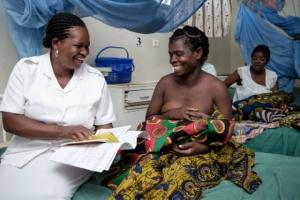Reducing Maternal Mortality: Stories from the field, Zambezia, Mozambique, 24 March 2015.
The road to Milange health centre is dry and dusty. The heavy rain falls in the beginning of the year in Zambezia province are a distant memory and Milange has not seen rains for days now. Chief maternal and child health nurse, Maria Florinda, and her assistant have most of their working day behind them. They have just assisted Elisa Uasone in the birth of a baby boy. Now they are filling out the last details of today’s register in the quiet maternity ward.
We have just finished attending the birth of Elisa’s little boy, says Maria. Everything went fine.
Maria has been working in Milange health centre for 14 years. She is responsible for the maternity ward. The health centre has experienced an increasing demand for ante-natal care and institutional deliveries in the past couple of years. Community radios and health activists encourage people to seek institutional health care throughout Milange.
Today we had around 30 ante-natal care consultations and one birth, says Maria. We are only 4 nurses in the maternity ward.
Skilled care, in a properly equipped health centre, before, during and after childbirth can save the lives of women and new-born babies. In 2012, 43% of deliveries in Milange district were carried out in a health centre. Two years later in 2014, 56% of all births took place in a health centre. Also the number of ante-natal care and post-partum consultations has increased.
When we arrive in the morning, we always start by giving some health education session to the women waiting, explains Maria. Then we attend the women who are accompanied by their husbands because the men often have to leave for work. But also to encourage women to bring their husbands to ante-natal care consultations. It is important that the men participate but today there were only two men for a group of 30 women.
Since 2012, health centres across Milange district have been equipped with desks, chairs, file cupboards and other supplies according to the need of each centre to meet the increasing demand for health services. To improve quality of care, nurses have been trained in essential obstetric care including ante-natal and postpartum care.
In the maternity ward next to the consultation room, Elisa Uasone sits quietly breastfeeding her new-born boy. She is exhausted after the birth but also relieved that everything went well.
I arrived this morning, says Elisa, I came from the neighbourhood with my husband on a bicycle. He had to work so he left after taking me to the health centre. He will be back soon.
The MDG 4&5 project aims to improve maternal and child health with particular focus on Zambezia province. Four UN Agencies work together to make this project happen: WHO, UNFPA, UNICEF and WFP with funding from the Canadian Department of Foreign Affairs, Trade and Development. One of the goals is to increase demand for and improve quality of skilled care before, during and after childbirth.
